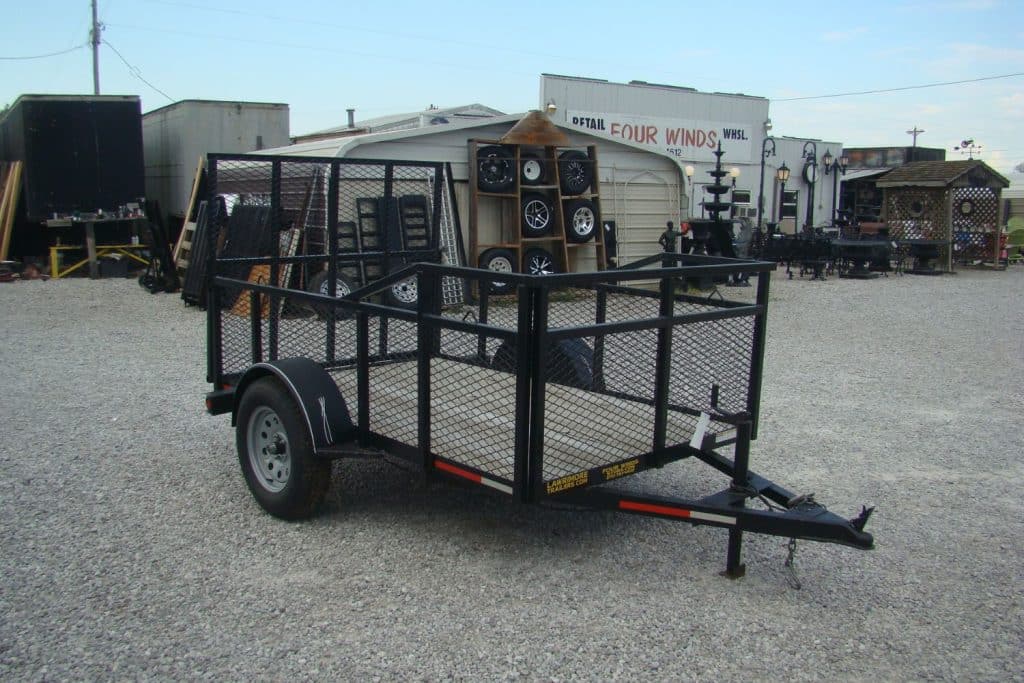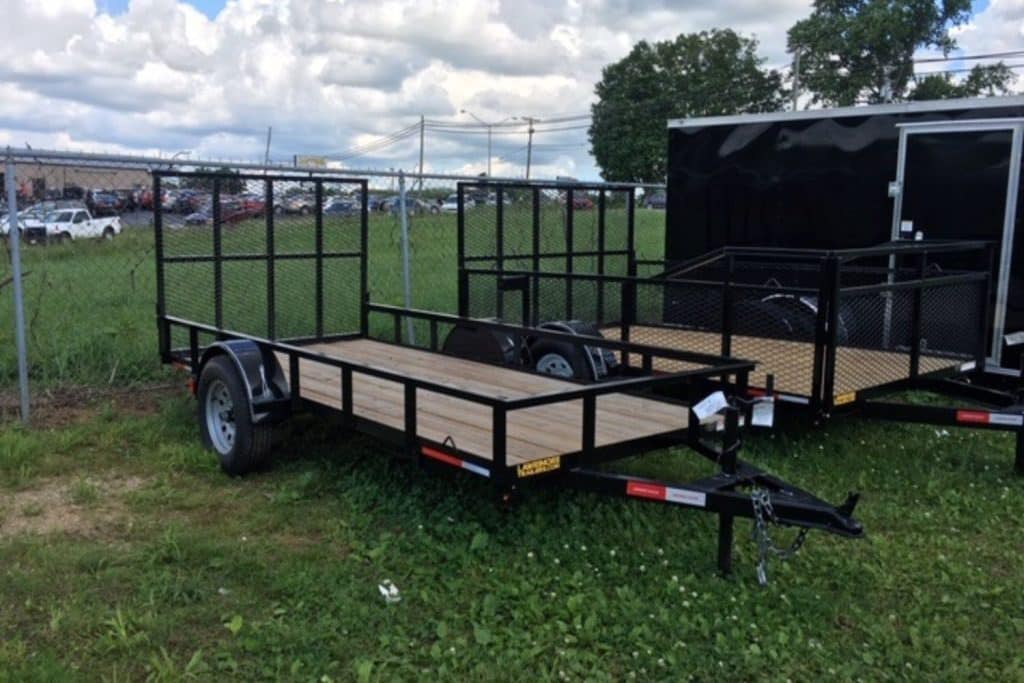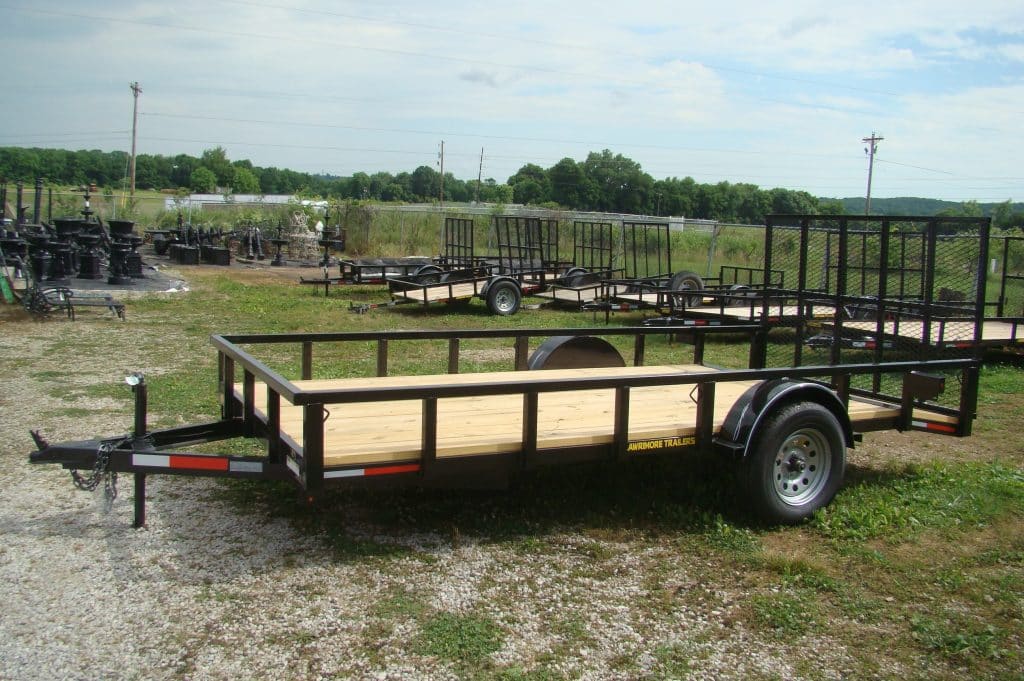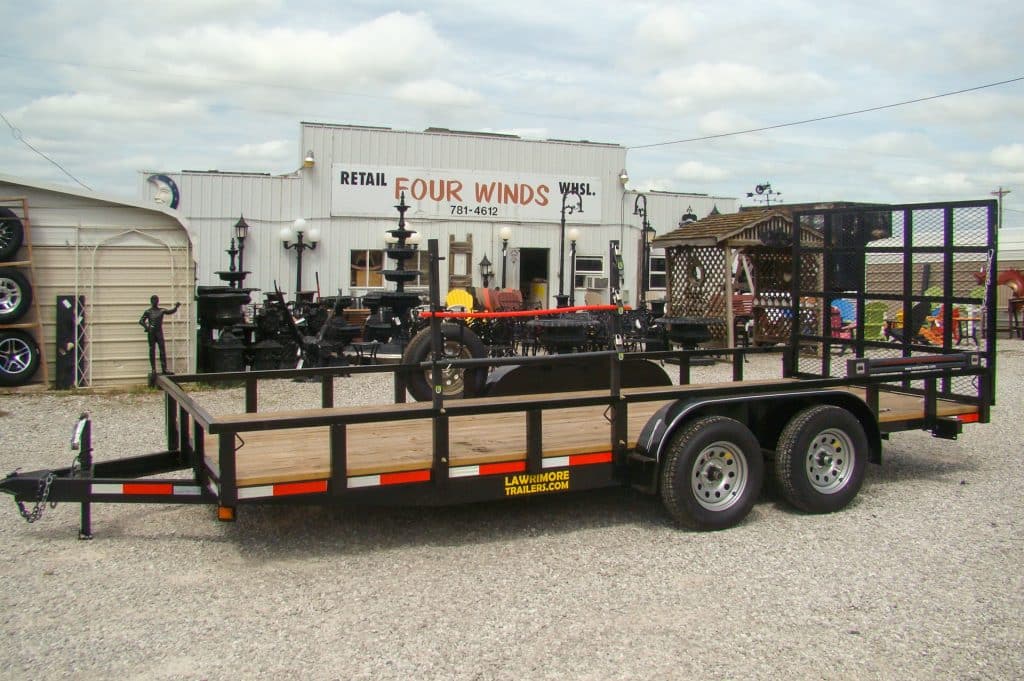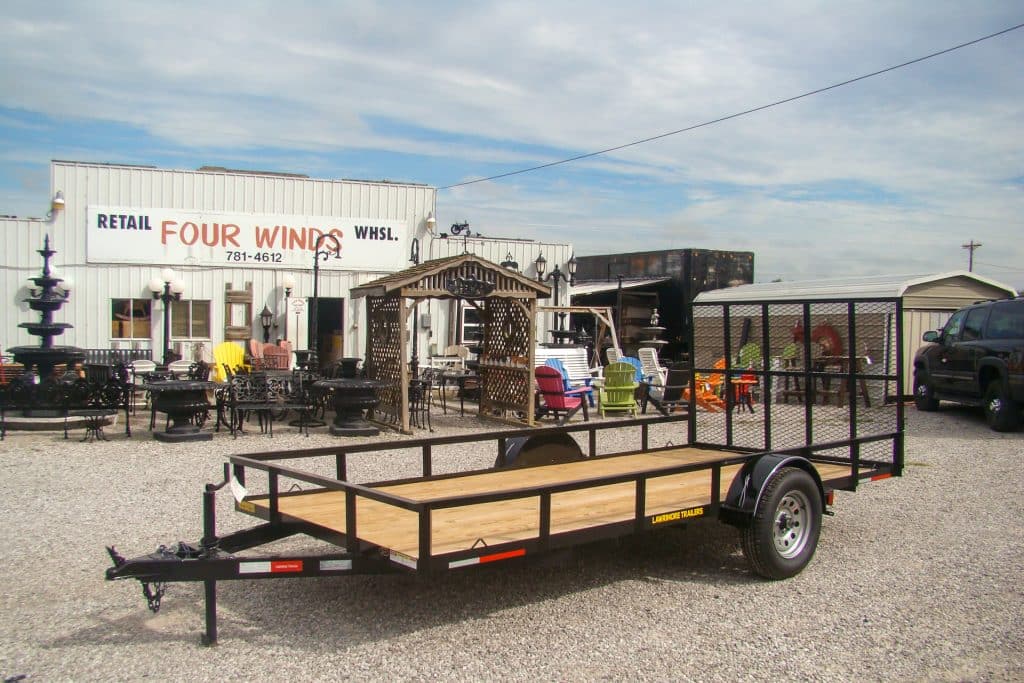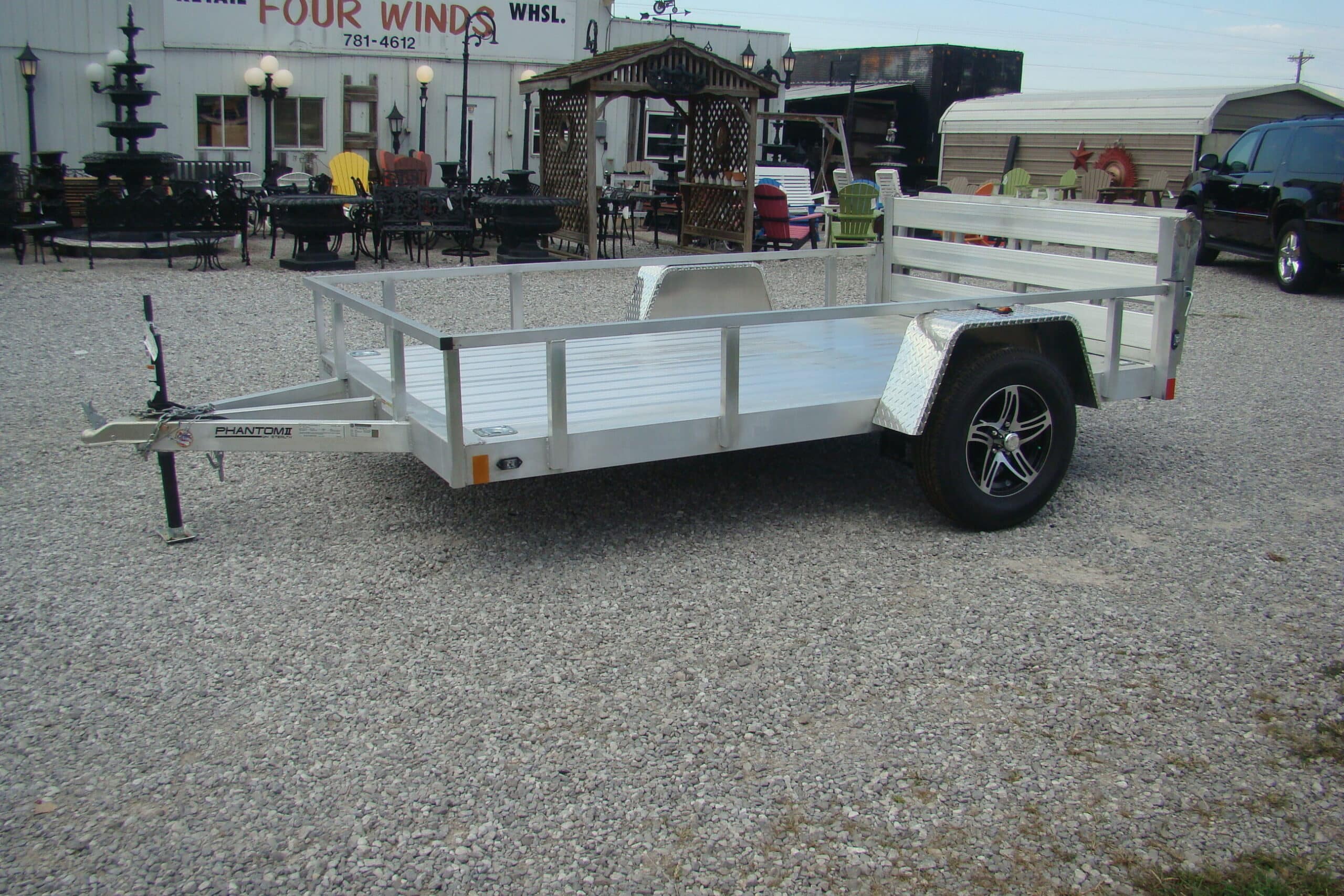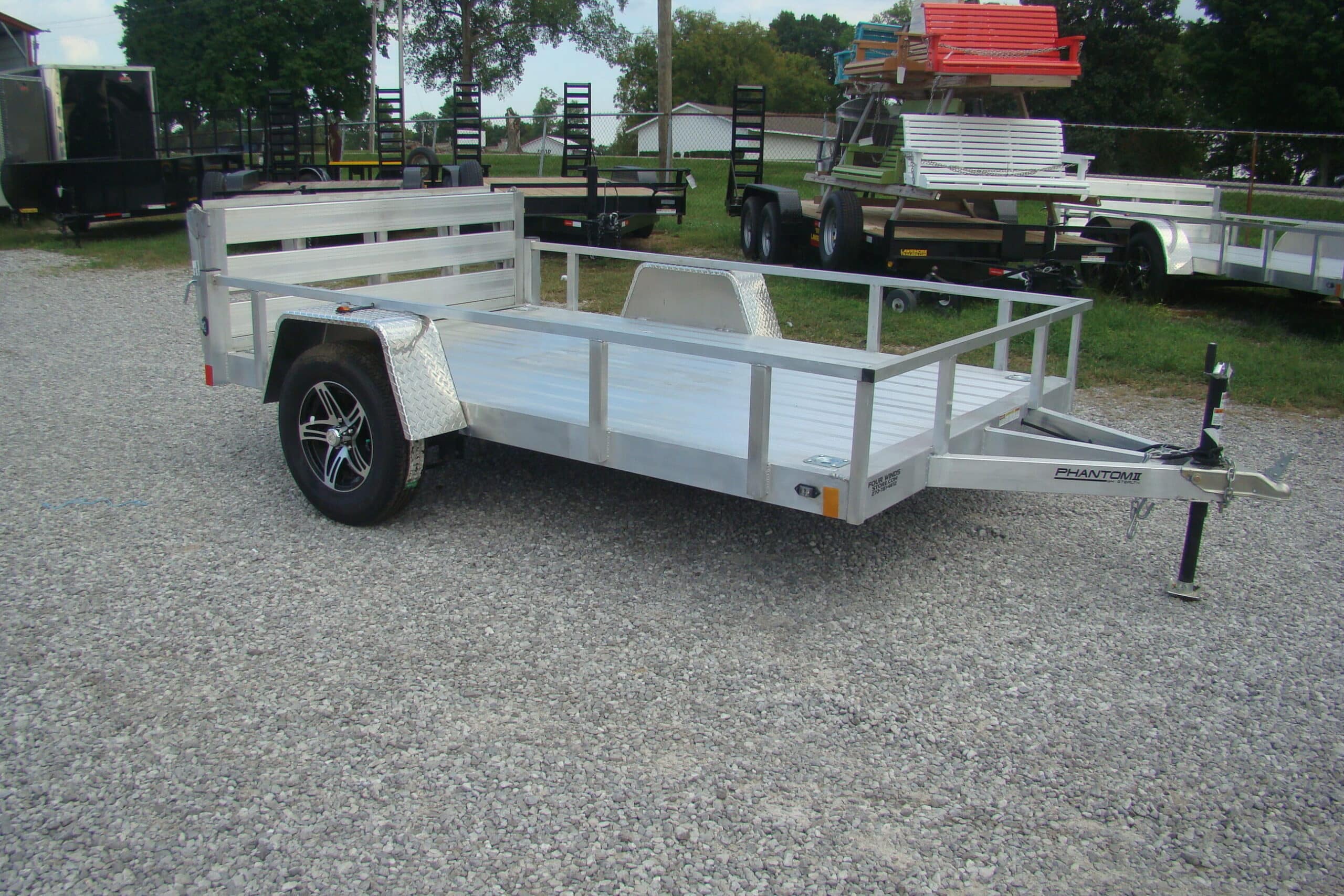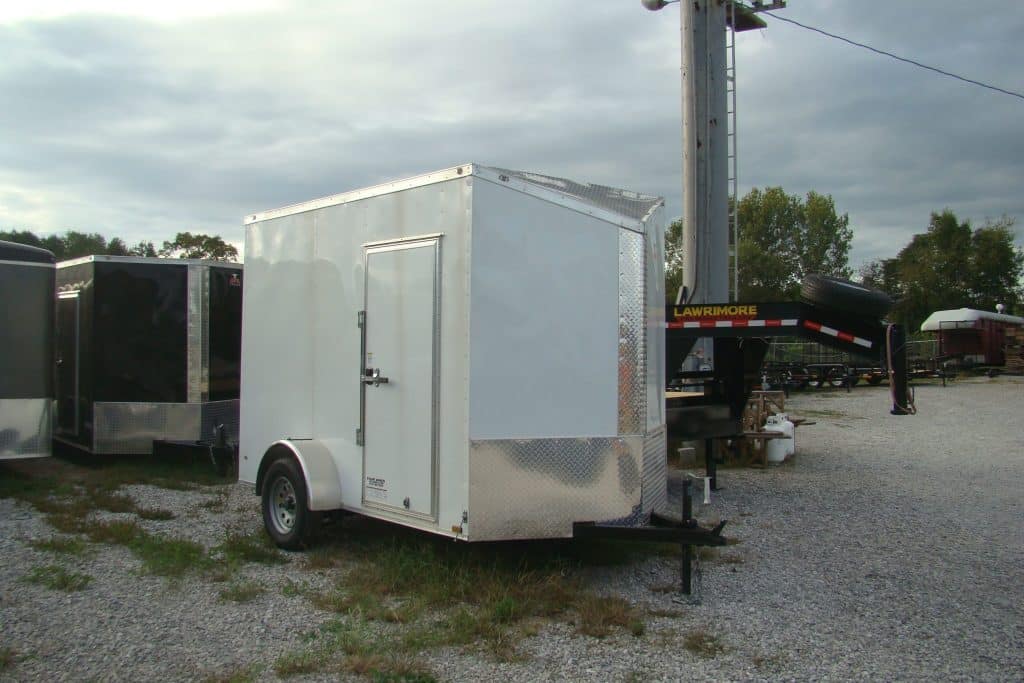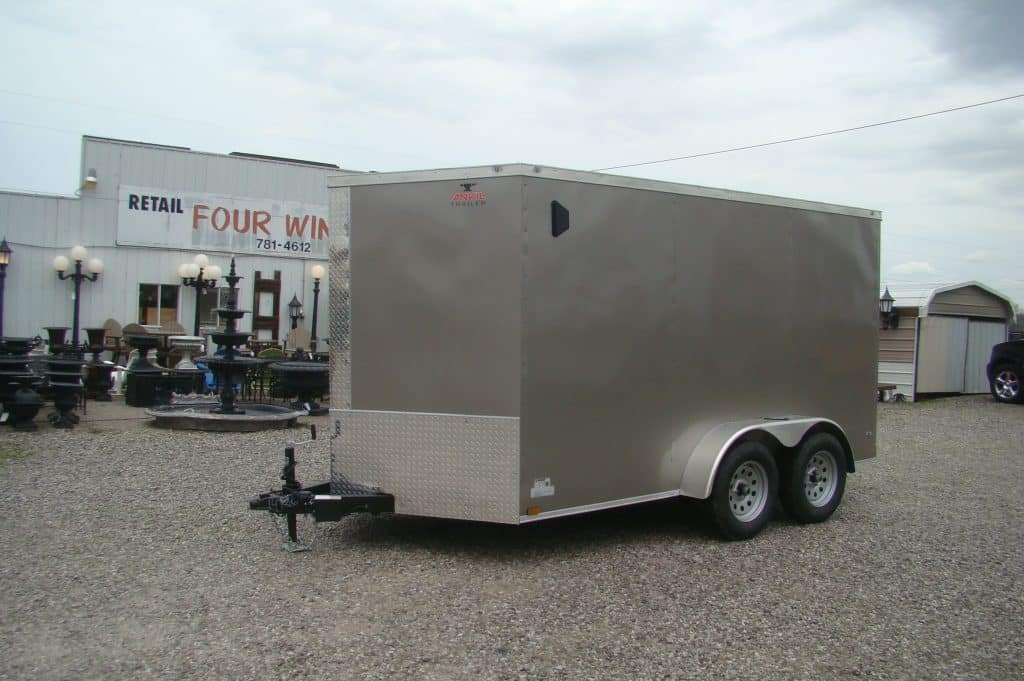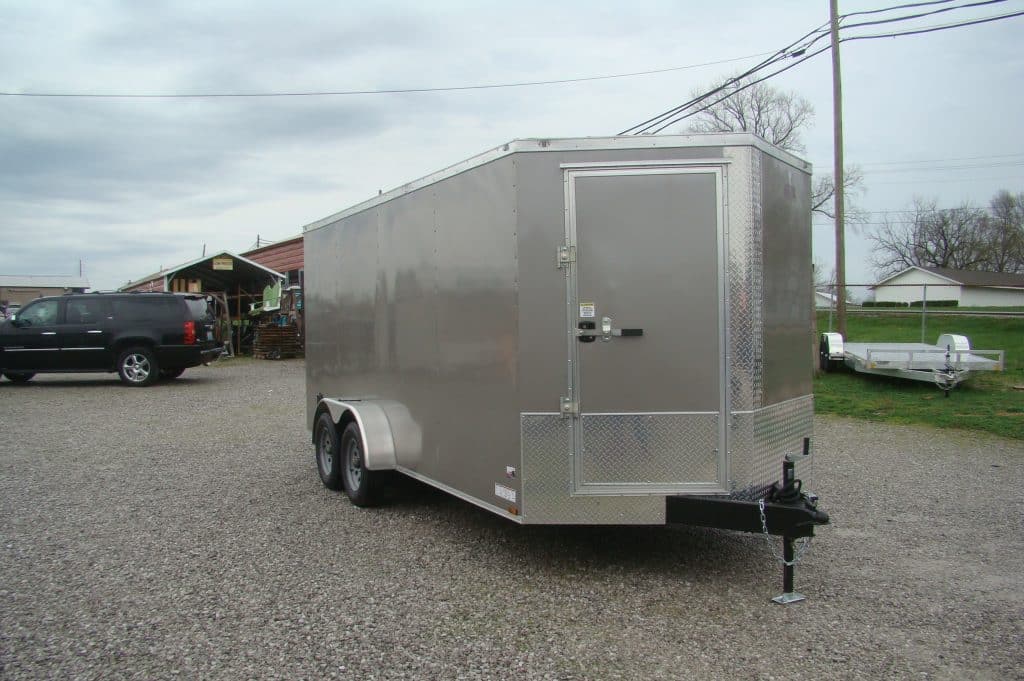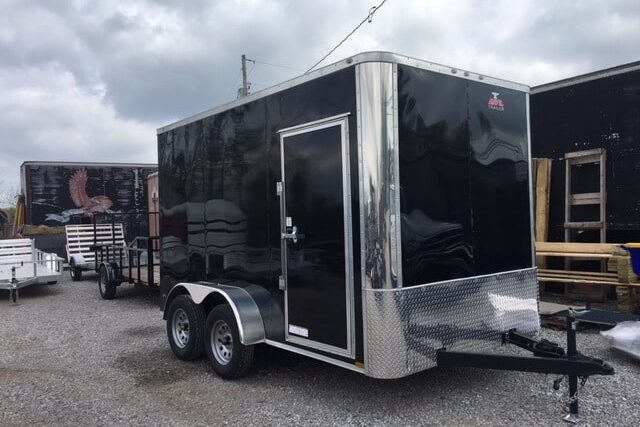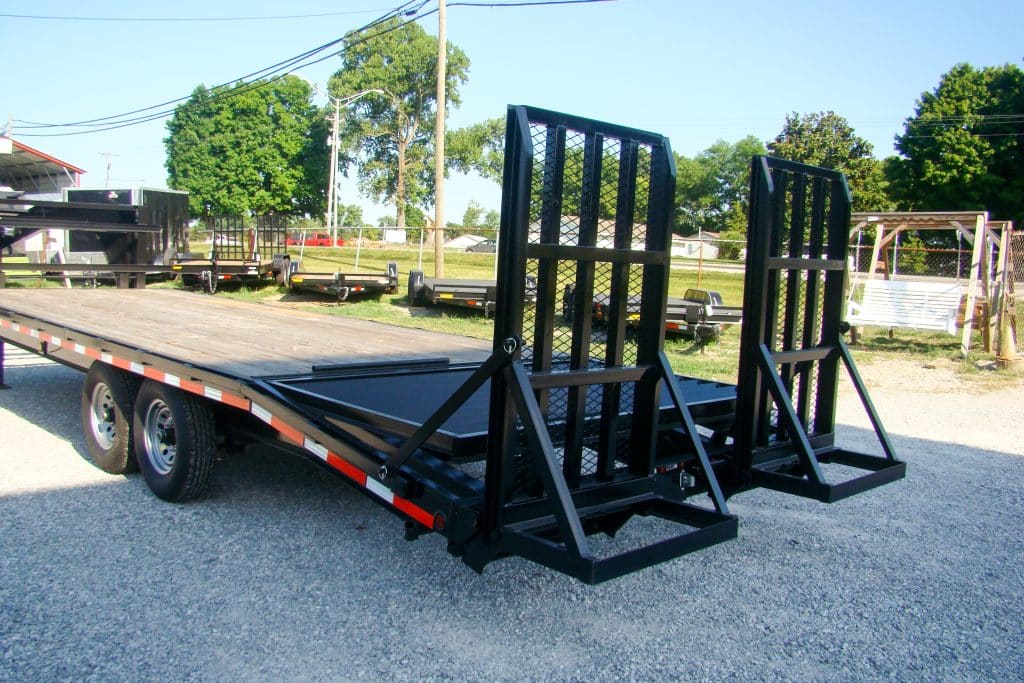
Finding the right trailer sizes can make all the difference as you begin to haul your load. Your trailer size depends on what you are moving and how those items need to be stored. In this article, we are going to take a look at some standard guidelines for picking the best trailer sizes.
How Do You Know What Size Trailer To Get?
Determining the best trailer sizes for your needs is going to be dependent on a handful of things. The first item you will want to determine is the size of your hauls. In this case, the idea of “haul size” takes on two meanings. The first meaning is physical size. How large are the items you will need to haul? It may seem obvious, but you will usually require far less space to haul a lawn mower than several couches.
The second meaning of haul size is how heavy your load is. Think of it this way– maybe you need to be able to tote around a few bales of hay for your hobby farm. The haul size is going to be far less in weight than a motorcycle. However, you may need the same trailer size because of the space the hay bales take up.
One tip we have found to help many people make the correct decision is that going slightly bigger than you think you will need will usually help you in the long run. No matter what size trailer you purchase, you will find that it has limits. However, buying a slightly larger trailer now will save you the money you would otherwise spend when you “need” to upgrade to the next size.
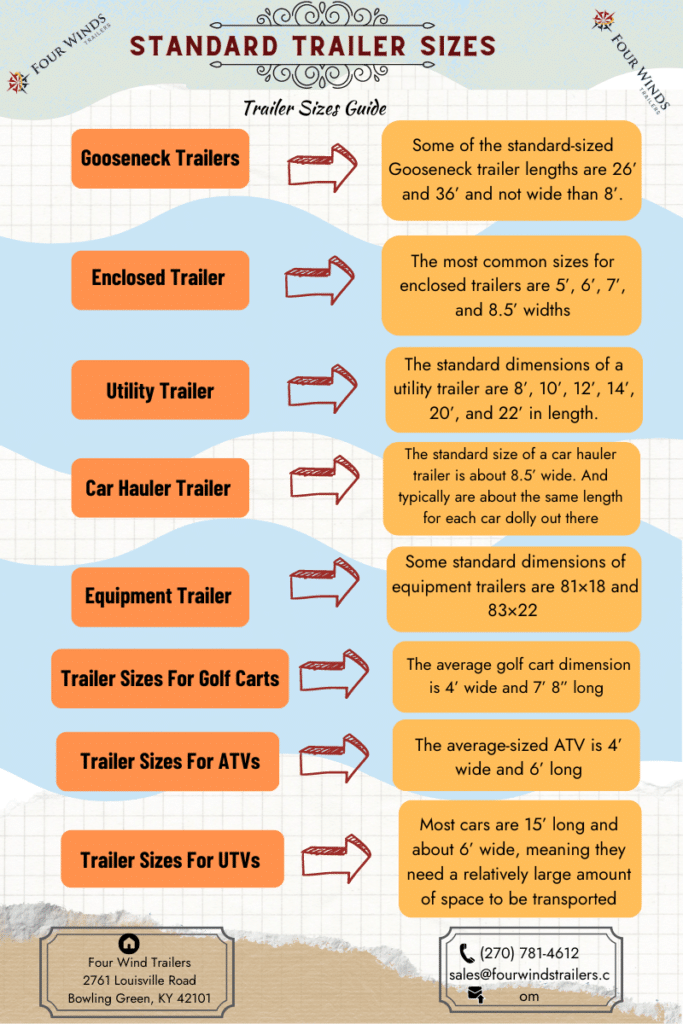
How To Read Trailer Dimensions
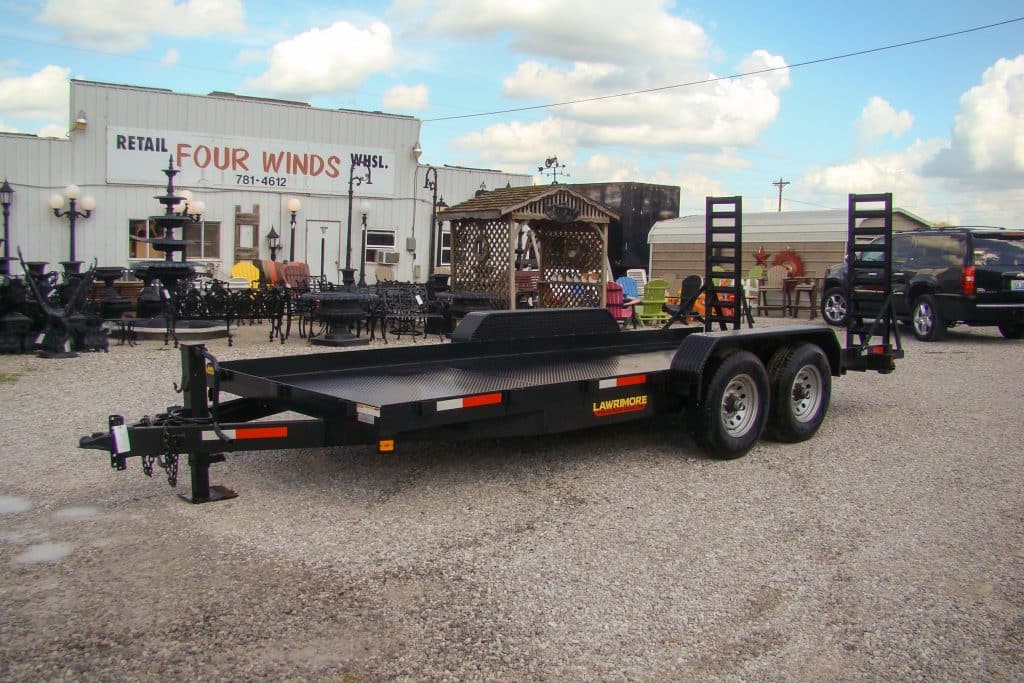
When you are looking at trailer sizes, it can seem a bit confusing to read the dimensions for the trailer size, especially when you see the sizes of 77×14. So let us help you understand the difficulty that has become deciphering the industry standard.
When you see a trailer listed like this, “77×14 Tube Utility Trailer w/5′ Heavy Gate,” it can read a bit odd. So, let us break that down for you. The 77 is a reference to the width of the trailer. These measurements mean the trailer size width is 77”, about 6.5’ wide. The 14 is a reference to how long the trailer is in feet. That later dimension means the trailer is 14 feet in length. Lastly, you see “w/ 5’ Heavy Gate.” The heavy gate alludes to the fact that the gate is made from heavy metals and is 5’ long when lowered—making the total length of this trailer 23 feet.
To recap, the trailer size listed above translates to this.
6.5’ wide x 18’ long with the ramp up
Or
6.5’ wide x 23’ long with the ramp down
You may wonder why the width is such a big deal and why it is put in inches instead of feet. The width of the trailer is set into inches because products are measured in inches instead of feet. Having this measurement in inches means you can more easily understand what will fit in the trailer. Additionally, a trailer should not be larger than the vehicle towing the trailer.
Common Enclosed Trailer Height
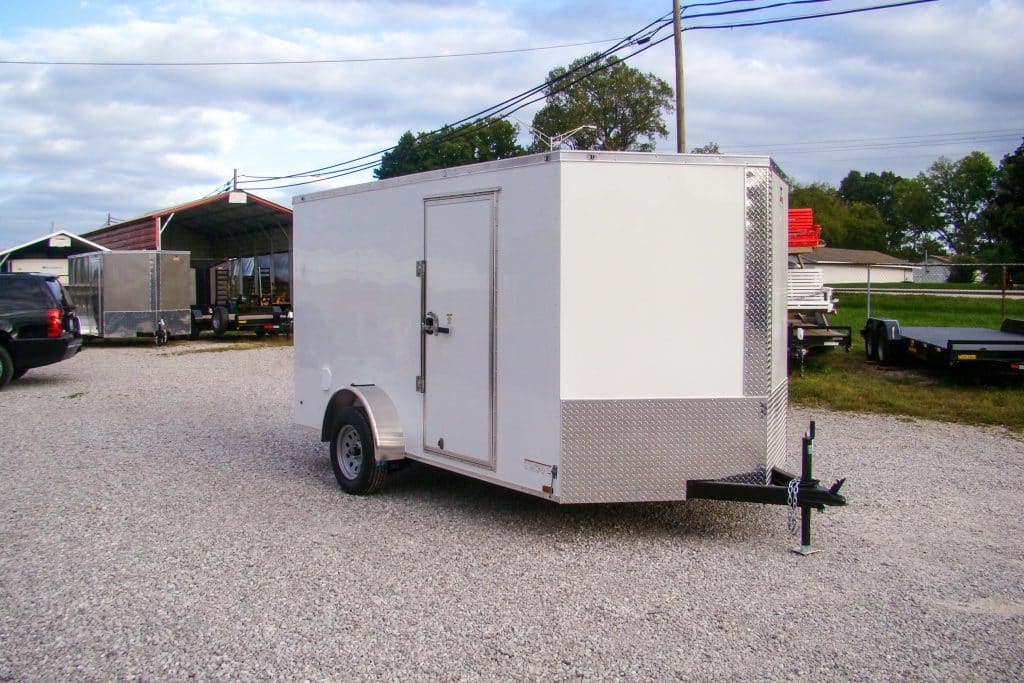
No matter the enclosed trailer size, the most common enclosed trailer height available is 7’. A 7’ ceiling allows for adequate hauling of most items that people have in their everyday lives. Other common heights are 5′ and 6′.
Some of the everyday things you will be able to haul in a trailer this size are;
- King-Sized Mattresses
- ATVs
- DJ Equipment
- Landscaping equipment
- Hunting Gear
Standard Trailer Sizes
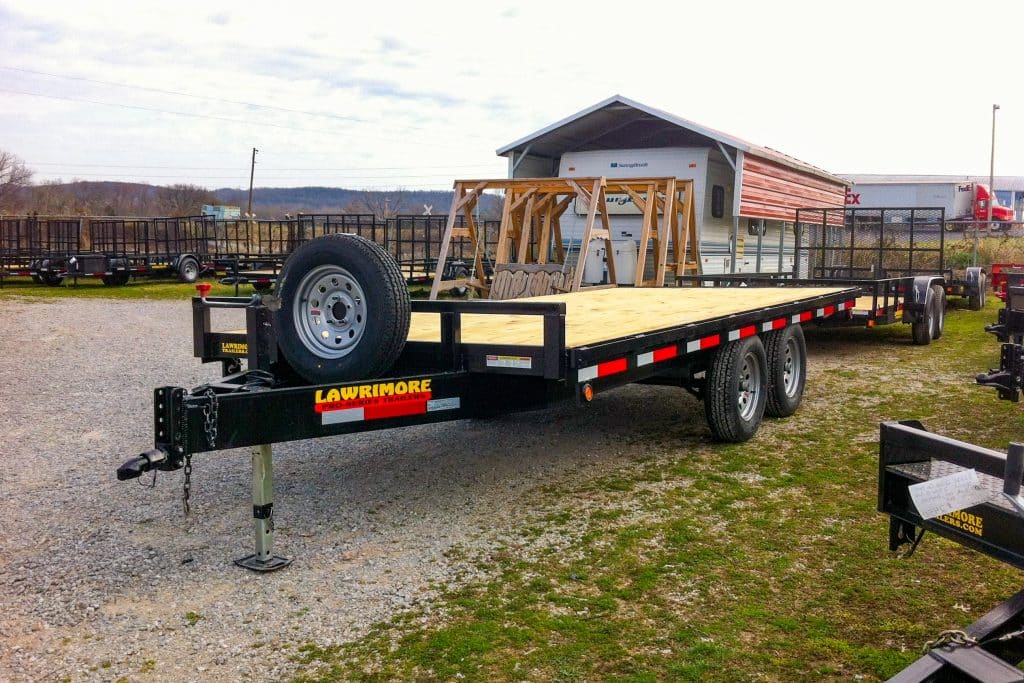
Trailer sizes come in a variety of lengths. These trailer lengths are going to be dependent on the style of trailer that you need. Whether you need a utility trailer, an aluminum trailer for landscaping, an enclosed trailer, a dolly trailer, or a hydraulic dump trailer, each style will provide you with a different size capacity.
Gooseneck Trailer Sizes
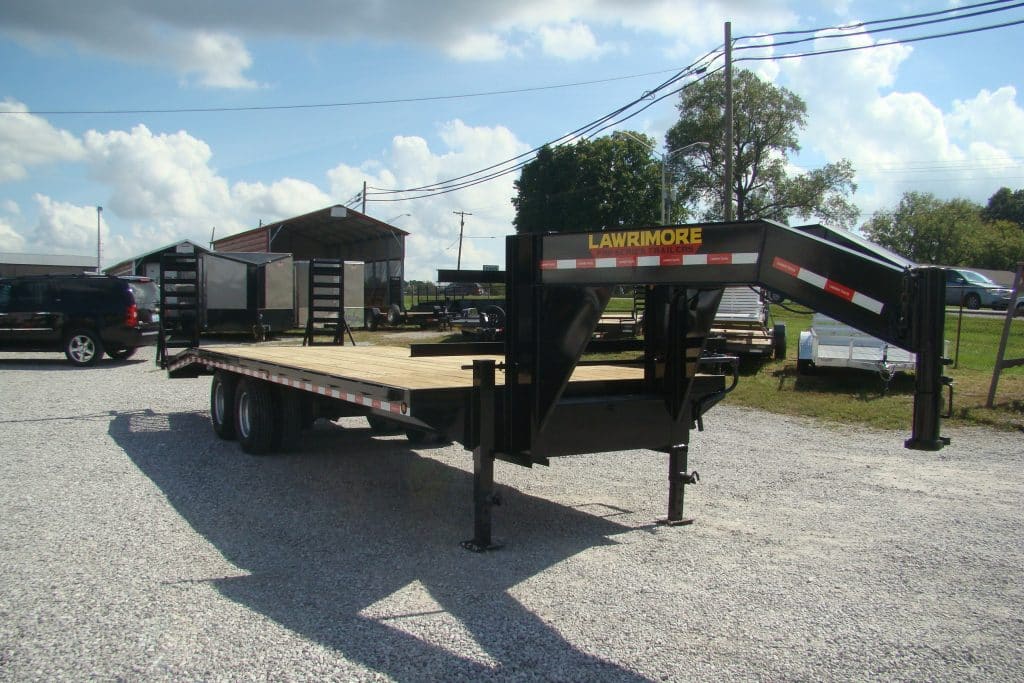
Gooseneck flatbed trailers are a great trailer size for the person who needs to do heavy moving work regularly, such as a steel storage container business. The benefit of a gooseneck trailer is the ability to haul large quantities of goods without the need for a full-on 18-wheeler truck.
What Are Standard Sizes For Gooseneck Trailers?
Some of the standard-sized gooseneck trailer lengths are 26’ and 36’ and not wider than 8’. This sized trailer allows for large items to be moved– even tiny homes. Additionally, a gooseneck trailer is an excellent solution for hauling heavy items such as large construction equipment. Common gooseneck trailer sizes typically range from 83×20 to 102×26, offering a variety of options depending on your hauling needs. The 83×20 is ideal for lighter loads, while the 102×26 provides extra length and capacity for larger or heavier items. Use this sizing chart to find out what trailer you need for your load.
Enclosed Trailer Sizes

Enclosed trailers are a great way to haul items you need to keep safe from the elements, even in transport. These features make the enclosed trailer size a solid option for lawn care crews, DJ/ Event companies, and those who transport restored vehicles.
What Are Standard Sizes For Enclosed Trailers?
The most common sizes for enclosed trailers are 5’, 6’, 7’, and 8.5’ widths. They are typically somewhere between 8’ long and 32’ long. As far as height, any enclosed trailer is traditionally 7’ tall. Common enclosed trailer sizes include 6×12 and 7×14, with the 6×12 being a great choice for smaller loads or personal use, and the 7×14 offering more space for larger cargo, making it suitable for business or more extensive hauling needs. View the enclosed trailer sizing chart here.
Utility Trailer Sizes
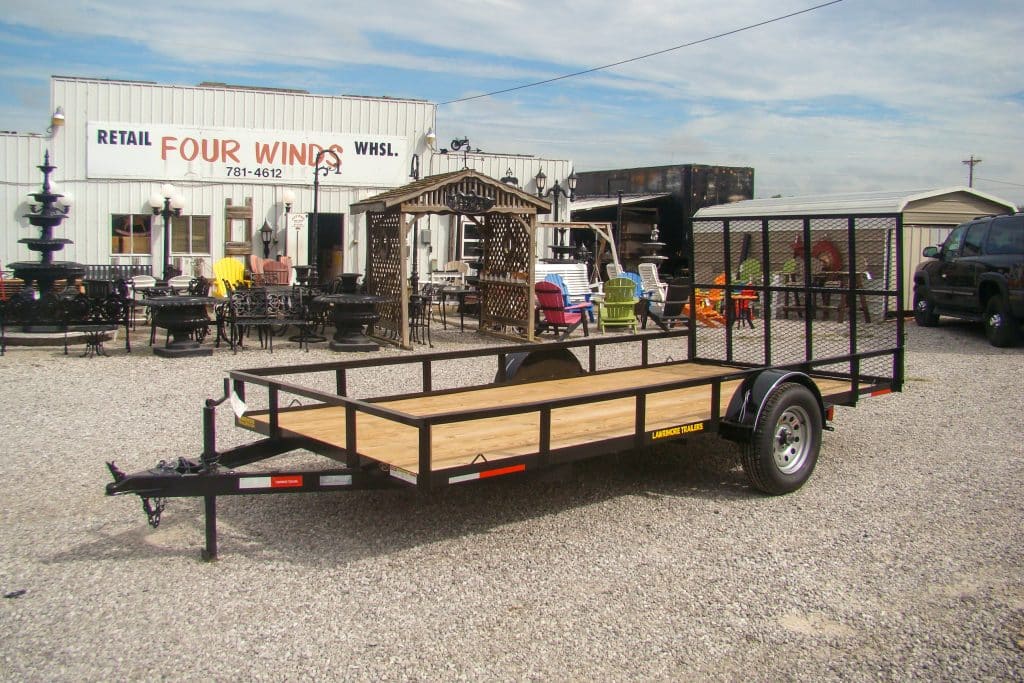
Utility trailers are the workhorses of the trailer family—everything from weekend mulch hauling to helping a friend move. The flatbed utility trailer size has seen it all due to its great versatility. These trailers serve most people the best because of their versatility, find out why utility trailers are the best here.
What Are Standard Sizes For Utility Trailers?
Standard utility trailer sizes are relatively straightforward. As we have discussed a few times, the standard dimensions of a utility trailer are 8’, 10’, 12’, 14’, 20’, and 22’ in length. Trailers seldom are larger than 8’ in width. Most popular utility trailer sizes are 5×12, 5×14, and 5×20. See the utility trailer sizes chart here.
Car Hauler Trailer Sizes
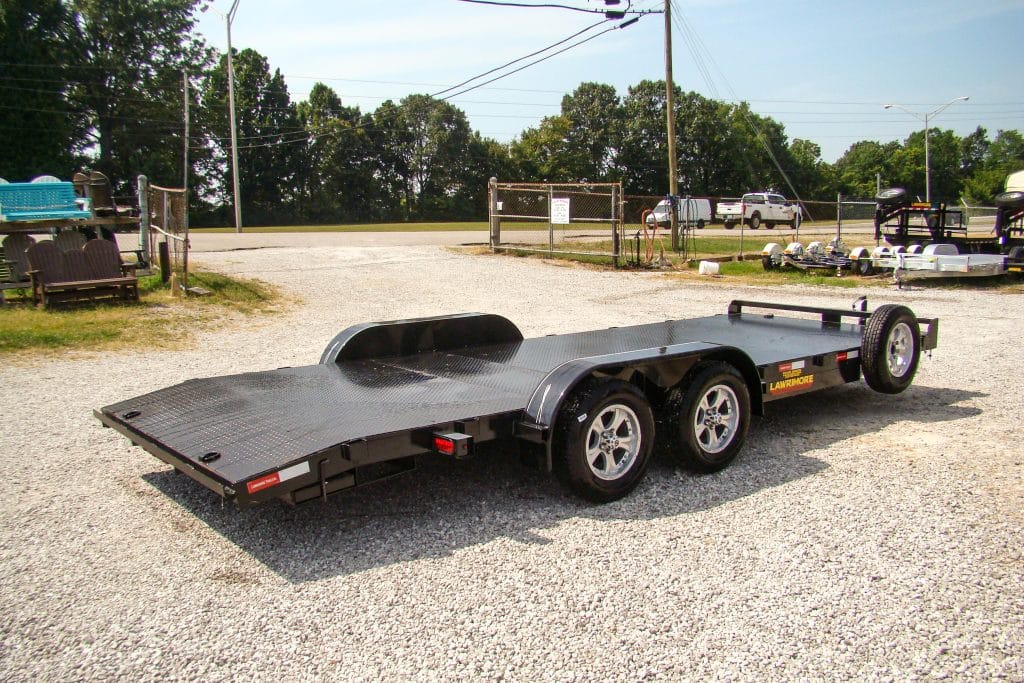
Car hauler trailers can mean two very different things. One may be like the utility trailers that we talked about above. A car can be placed upon the trailer and transported that way. It can also mean a tow dolly attached to the back or a larger vehicle that simply pulls the car behind itself. For the sake of this section, we are going to focus on the car dolly idea.
What Are Standard Sizes For Car Hauler Trailers?
The car dolly comes in a standard size of about 8.5’ wide. Typically are about the same length for each car dolly out there. However, where they can differ significantly is the kind of breaking systems in each type of car dolly. Want to know how to tow a car on a dolly? Read this blog to find out or learn more about car hauler trailers with this sizing chart.
Equipment Trailer Sizes
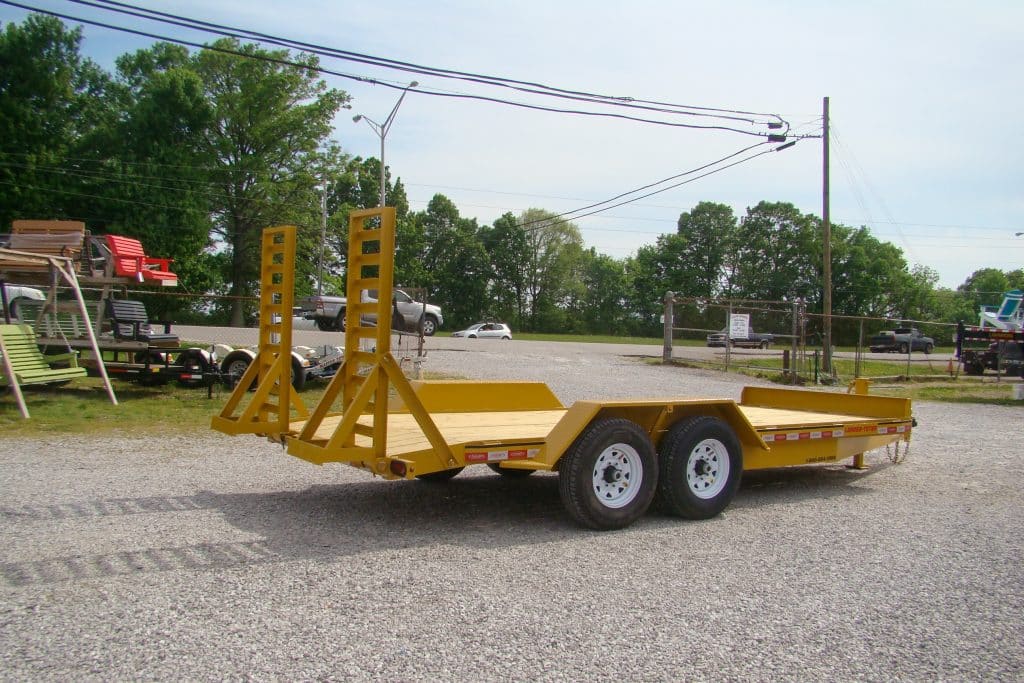
If you need to transport heavy equipment, these are the trailers for you. These heavy equipment trailers are built to carry the heaviest and toughest haul items. Complete with fold-up ramps, a wood or diamond plate floor, and adequate trailer lighting. Equipment trailers are often very open with no siding to ensure they can carry oblong objects.
What Are Standard Sizes For Equipment Trailers?
Equipment trailers generally have 20-foot lengths. This allows them to carry the maximum capacity that you need. There are smaller equipment trailers, but you usually won’t see them very often. If you are in the market for an equipment trailer, be sure to calculate what you will be most often towing. A popular equipment trailer size is 83×20, which ensures ample space for hauling a variety of machinery and equipment, providing a balance of length and width for easy loading and transport. Browse our sizing chart to find the right equipment trailer for you.
Specific Trailer Sizes
Now that you have a general idea of the most common trailer sizes for each type, you may wonder how to determine exactly what trailer size you need. The exact size will vary depending on the type of haul you have, the style of trailer you plan to use, and your towing vehicle’s capacity. Let’s explore some factors you need to determine the correct size trailer for your next job.
What Are You Hauling?
First, consider what you will be hauling. The trailer will need to accommodate the dimensions of what you plan to haul and what kind of support the load will need. For example, you’ll want an enclosed trailer for hauling livestock so they are secured safely inside the trailer, whereas you’d want a car hauler trailer for towing vehicles as they are specifically designed for that purpose.
How Heavy Is Your Load?
Next, you’ll need to know how heavy the cargo is. You’ll want to select a trailer that is long and wide enough to support it and also has the capacity to support that kind of weight. For example, a gooseneck trailer is better for heavier loads than a single-axle trailer as it can support more weight.
What Is Your Vehicle’s Towing Capacity?
Your towing vehicle, whether car or truck, will need to handle the combined weight of the trailer and whatever it is hauling. In your user manual, the towing capacity of that vehicle will be listed, telling you how much weight it can support. You don’t want to get a trailer that cannot tow.
Where Do You Plan To Store The Trailer?
Wherever you plan to store your trailer, you want to ensure the trailer that you get will fit. If you’re looking for a trailer for a job, you may have a larger storage space than someone who needs to store the trailer in their garage.
Will A Trailer Fit In A Garage?
Yes, most trailer sizes can fit in a garage! There are two items that you will need to make sure are in place so that your trailer can fit in. The first item is the height; the average garage door is 7’ tall. So if you plan to have an enclosed trailer in your garage, ensure that the height parameters accommodate the need. Second, the average single garage door opening is 9 feet wide. However, this can be far less problematic if you have a two-car garage door, as they average a space of 16-18 feet.
Put simply; a single one-car garage could handle an 8’ wide trailer about 20’ long.
What Size Trailer Do I Need?

Each trailer size serves a different purpose. When it comes to trailers, bigger is not always better, as having a bigger trailer will cause a larger gas bill when you haul it. That’s why selecting the right-sized trailer for the job is a great way to help you figure out what you need to move your things and not overdo it.
What Size Utility Trailer Do I Need?
Utility trailers are typically used to haul lawn and garden equipment, furniture and appliances, building materials, ATVS, motorcycles, or small vehicles. With this in mind, here are the utility trailer sizes you’ll need for these types of hauls:
How To Measure A Utility Trailer
To measure a utility trailer, first measure the inside floor length from the front wall to the rear of the trailer, not including the tongue. Then, measure its inside width from one side wall to the other. Now, you can get the total length of the trailer from the front tip to the tongue. Finally, if you want to determine the trailer’s weight capacity, check the axle rating on the trailer’s label or plate.
Utility Trailer Sizes For Golf Carts
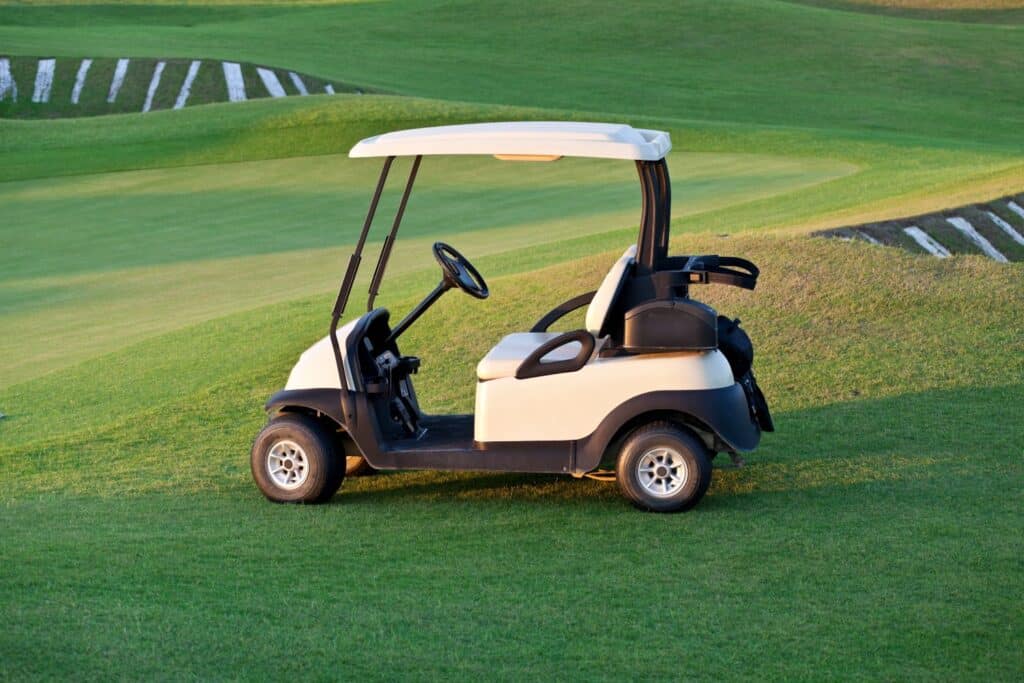
The average golf cart dimension is 4’ wide and 7’ 8” long. With these dimensions, it would be best to have a utility trailer size that is at least 5’ wide and 8’ long.
Utility Trailer Sizes For ATVs
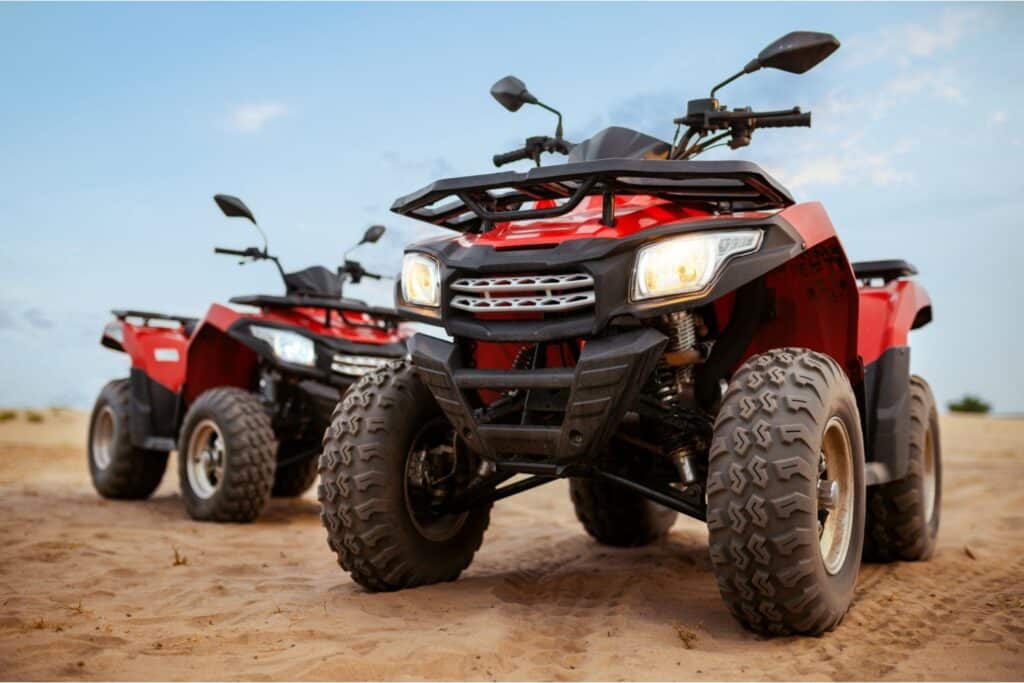
The average-sized ATV is 4’ wide and 6’ long. This size trailer will not leave you with much additional space for taking items to travel, so we recommend getting utility trailer size larger than this.
Trailer Sizes For Cars

No matter if you love a good classic car or pick up old ones for scrap, a utility trailer is the best way to get started in car transportation. Most cars are 15’ long and about 6’ wide, meaning they need a relatively large amount of space to be transported. These dimensions mean cars must be transported on a utility trailer approximately 16’ long and 8’ wide.
Utility Trailer Sizes Chart
Below is a chart outlining the utility trailer sizes recommended for what you’re planning to haul. Please note that these are based on standard haul sizes and may not reflect the exact size you need.
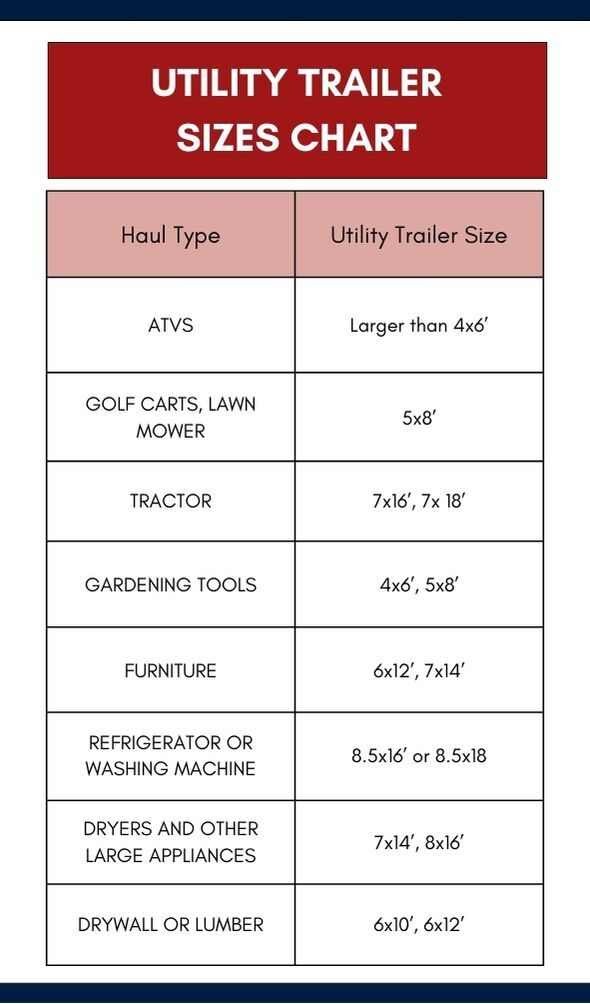
When it comes to transporting goods, having the right utility trailer size can make a big difference. Our utility trailers are built with safety and durability in mind, featuring strong construction and reliable braking systems. Whether you’re a business owner, homeowner, or just seeking adventure, having the right size trailer ensures your peace of mind while on the road.
What Size Enclosed Trailer Do I Need?
Enclosed trailers are typically the right choice if you plan to tow UTVs, construction equipment, landscaping supplies, or personal belongings that would need to be shielded from the elements and secured while on the road.
Enclosed Trailer Sizes For UTVs
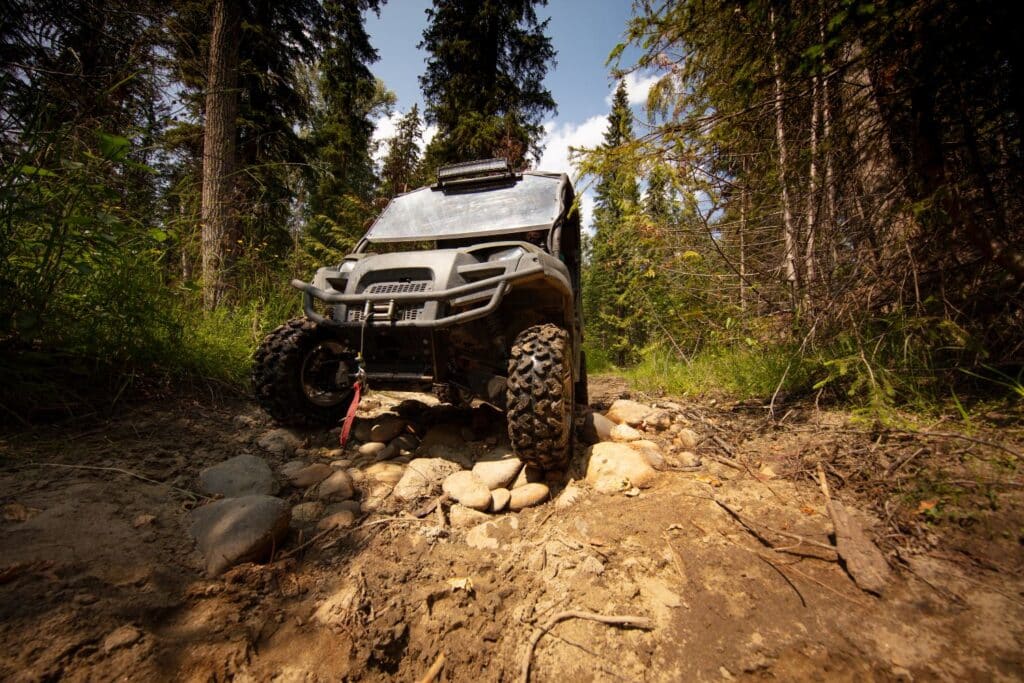
UTVs are a great way to get those deer cams up and quite literally blaze trails. Due to their design, they are well suited to be transported inside an enclosed trailer that is at least 8’ wide by 8’ long. This also gives you a little additional space for storing items that need to be kept weather safe.
Enclosed Trailer Sizes Chart
Below is a chart outlining the enclosed trailer sizes recommended for what you plan to haul. Please note that these are based on standard haul sizes and may not reflect the exact size you need.
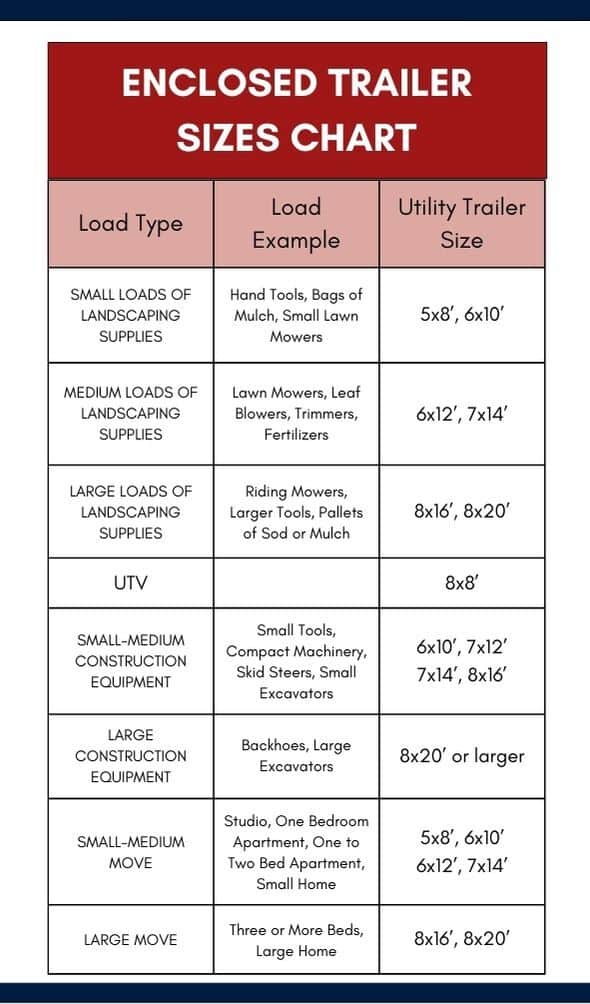
When it comes to protecting your cargo from the elements and ensuring it is secured during transport, the size of your trailer matters. Our enclosed trailers offer ample storage space for construction equipment, landscaping supplies, or substantial household moves. Customize your enclosed trailer with additional features like interior shelving, racks, HVAC systems, or lighting to meet the unique needs of your hobby or business.
What Size Car Hauler Do I Need?
A car hauler is designed specifically for hauling vehicles of standard sizes, such as cars, SUVs, trucks, and vans. The exact size of the car hauler you need will depend on the make and model of the vehicle you plan to tow. This will tell you the car trailer width, length, and weight capacity you will need.
How Wide Is A Car Hauler Trailer?
Car hauler trailers typically come at a standard width of 8 or 8.5 feet to accommodate most vehicles, such as sedans, coupes, SUVs, and trucks.
What Size Trailer Do I Need To Haul A Truck?
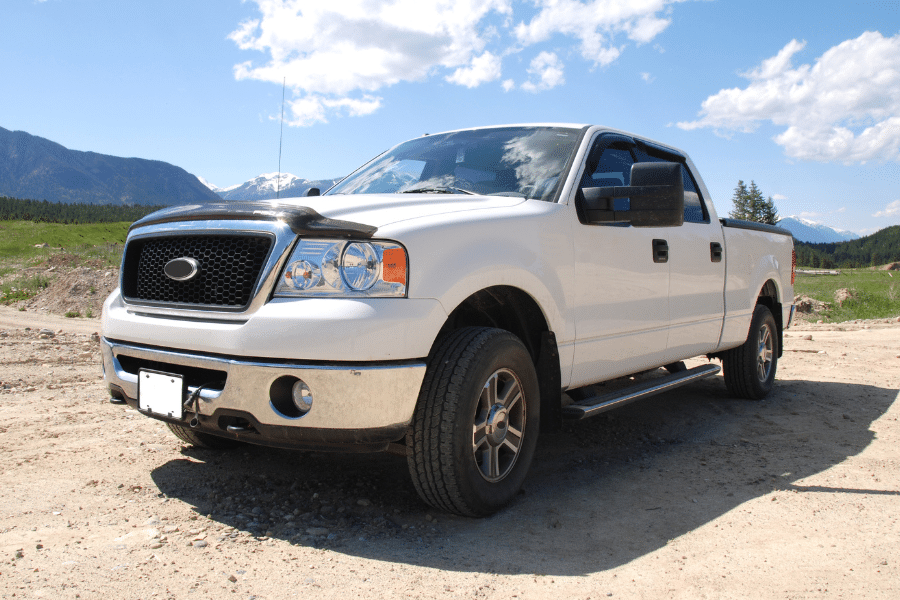
It will depend on the type of truck you’re planning to tow. For a small or midsize truck like the Toyota Tacoma, an 8.5×16’ or 8.5×18’ should be sufficient. A full-size truck like a Ford F-150 may require an 8.5×18’ or 8.5×20’ trailer. A trailer size of 8.5×20’ or larger is recommended for heavy-duty trucks.
Car Hauler Trailer Sizes Chart
Below is a chart outlining the car hauler trailer sizes recommended for what you plan to haul. Please note that these are based on standard haul sizes and may not reflect the exact size you need.
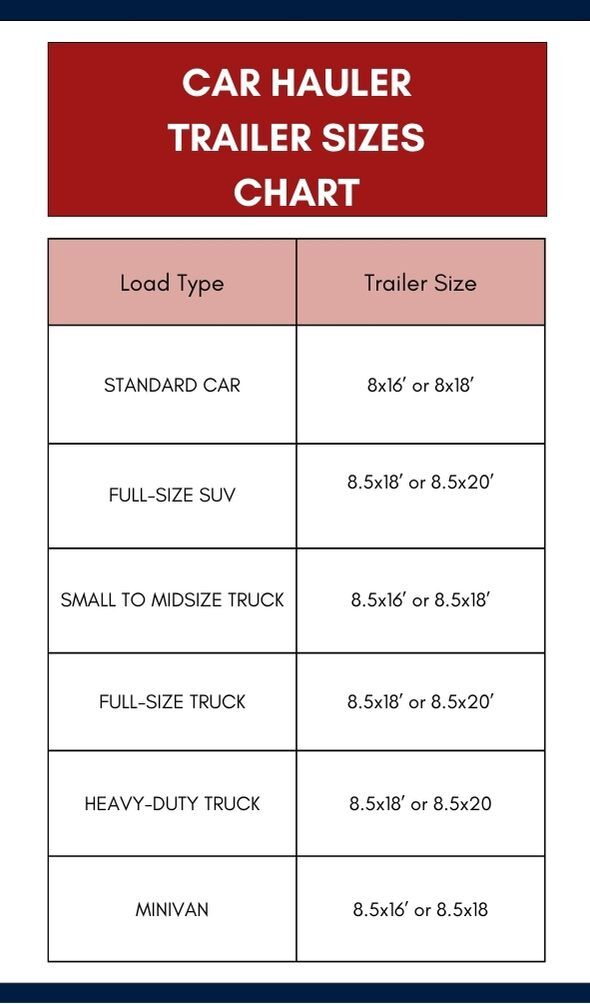
What Size Equipment Trailer Do I Need?
As the name suggests, equipment trailers are designed specifically for hauling equipment. The exact trailer size you’ll need will depend on the type of equipment you plan to haul.
Equipment Trailer Sizes Chart
Below is a chart outlining the equipment trailer sizes recommended for what you plan to haul. Please note that these are based on standard haul sizes and may not reflect the exact size you need.
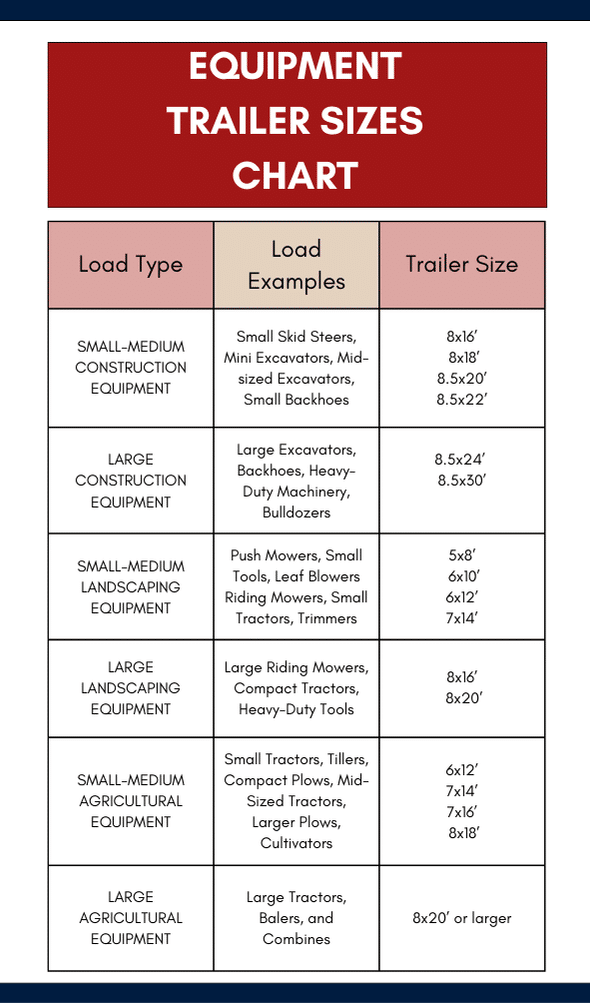
What Size Gooseneck Trailer Do I Need?
Gooseneck trailers are built for hauling large or heavy loads, making them an excellent choice for towing heavy equipment, large cargo, livestock, and other specialized loads. To determine the exact length and width of the gooseneck trailer you’ll need, you first want to identify what type of load you’ll be hauling.
Gooseneck Trailer Sizes Chart
Below is a chart outlining the gooseneck trailer sizes recommended for what you plan to haul. Please note that these are based on standard haul sizes and may not reflect the exact size you need.
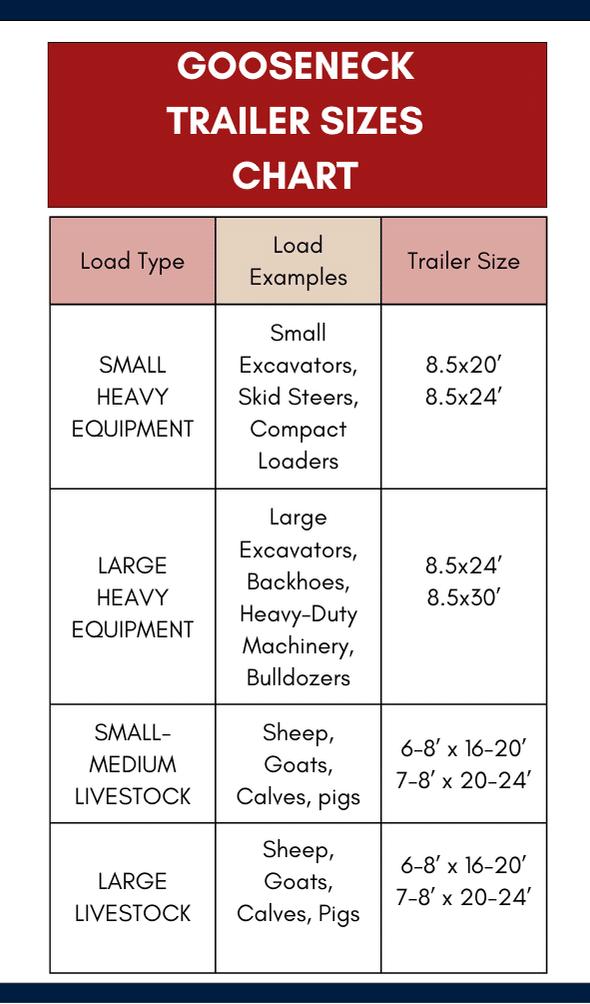
Trailer Sizes Conclusion
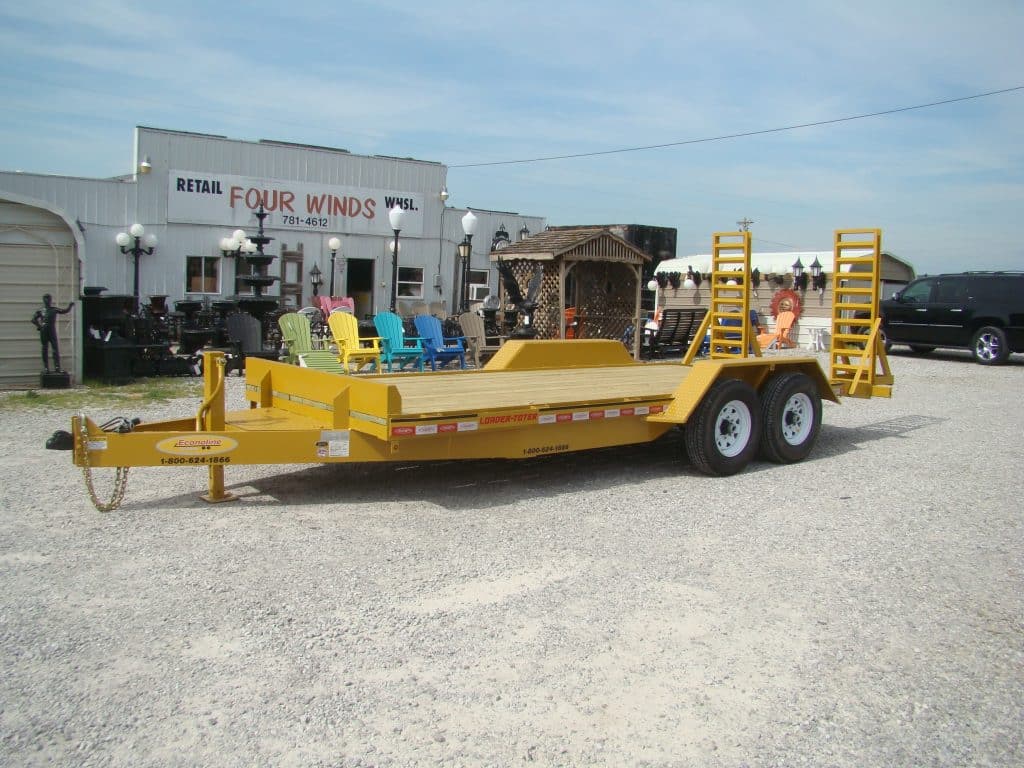
Purchasing the proper size trailer matters. Go too small, and you won’t be able to transport what you need. Go too big, and you’re stuck with a hefty gas bill for pulling extra weight for no reason. No matter the size trailer you need, Four Winds Trailers has a wide selection available. We offer rent-to-own trailer options so everyone can find just what they’re looking for! So check out our inventory, contact us, or stop by to see what size trailer fits your needs.

